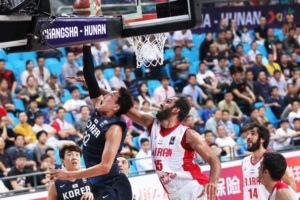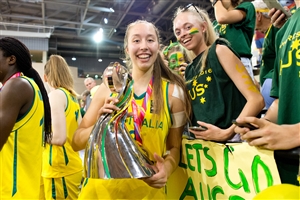
New Zealand narrowly avoids huge upset loss to Guam
REGENSBURG (David Hein's Eye on the Future) - You may not have realized it but the basketball world was close to one of the biggest upsets in the sport's history last week. The near Earth-shaking game took place at the FIBA U17 Oceania Championship 2017 - and saw Guam nearly shock New Zealand.
Okay, if you look at the box score, you might be wondering what the heck am I talking about. New Zealand won 90-78 in the Group A game on July 11, no big deal, right?
Well, not so fast.
The next day, I asked a colleague from New Zealand who is very closely involved in the game of international basketball the following question: "So, how nervous were you against Guam?"
The answer: "Shaking like a leaf."

This was New Zealand, ranked 33rd in the Nike FIBA World Rankings for Youth Men facing 75th-ranked Guam, who is placed behind fellow Oceania countries New Caledonia (68th) and Tahiti (71st). And the only other time Guam had faced New Zealand in a youth men's competition was last year at the FIBA U18 Oceania Championship 2016, where New Zealand won 116-54 in the Semi-Finals.
But it shouldn't really surprise anyone that my colleague - and the rest of New Zealand fans watching - was shaking in his boots - especially if you actually watched the game. I went back for this column and re-watched it and the drama grew steadily the whole game - and I knew the result.
Guam, who were hosting the U17 competition, came out ready to play in front of the home fans. They led by five points late in the first quarter, which ended with Guam up 19-16. The lead grew to seven points (25-18) before a New Zealand 6-0 spurt made it 31-30. The New Zealand advantage grew to five points (39-34) but Guam continued to hit three-pointers and went up 43-40 and were leading 43-42 at the break.
New Zealand opened the second half with the first eight points, but Guam were unfazed and reeled off a 10-0 run to lead 53-52. New Zealand answered with seven straight points and were up 65-60 after three quarters.
Guam failed to score for the first time two minutes of the fourth quarter and the lead reached double-digits at 71-61. And with four minutes to play it looked like New Zealand had finally delivered the much-anticipated knockout punch, leading 80-65.
 Jahmar White hit the last of Guam's 11 three-pointers to make it an eight-point game with 2:30 minutes left.
Jahmar White hit the last of Guam's 11 three-pointers to make it an eight-point game with 2:30 minutes left.
But Guam had been getting good looks at the basket. And then those shots started to fall - with Gabriel Simon nailing two three-pointers and Jahmar White's corner three-pointer trimming the deficit to 82-74 with 2:30 minutes remaining and the home fans hoping for the miracle upset.
Then came the fate-deciding call. I am not a referee and I respect the job they do. I also do not believe that referees' decisions decide games. The points that a team scores off a "missed" call at the end of a game for example could have been made up with two turnovers fewer over the course of the previous 39 minutes or any number of opportunities.
That being said, this call did take all the momentum out of the game for Guam as New Zealand tallied the next eight points for a 90-74 lead with 45 seconds left - deciding the game.
In the ensuing New Zealand possession after White's three-pointer to make it 82-74, New Zealand's Isaac Faamausili drove to the basket and Guam's De'Aundre Cruz appeared to be set for a charge but was called for a flop and a technical foul. Looking at the replay, it appears that Faamausili's elbow does go pretty high.
Again, I am not questioning the referee's decision. Instead this is just a presentation of the situation. New Zealand captain Oscar Oswald hit the free throw and Matthew O'Connell scored a layup in the possession for the technical. And the lead was 16 points on Joseph Ahie's three-pointer inside the final minute.
 Matthew O'Connell converted the layup after the technical to put New Zealand on the road to victory.
Matthew O'Connell converted the layup after the technical to put New Zealand on the road to victory.
Would Guam have won if the flop technical was only called a normal defensive foul and Faamausili went to the line for free throws? Who knows? Guam did make 11-of-23 three-pointers (48 percent) in the game. And maybe they could have made the final minute exciting. But the momentum had clearly been shifted.
This column is not about that possession. It's about how close New Zealand were to a devastating loss. If New Zealand would have lost, they would have most likely finished second in Group A and then faced Australia in the Semi-Finals instead of possibly in the Final - as was the case.
The alignment of the planets and galaxies is back on as New Zealand pulled away late. But Guam were close to a massive upset #FIBAU17Oceania
— David Hein (@heinnews) July 11, 2017
What is the meaning of that, you might ask. Well, only the two finalists qualify for the FIBA U18 Asia Championship 2018, which then serves as the qualifier for the FIBA U19 Basketball World Cup 2019. So that would have meant that only one of Australia or New Zealand would have even made it to the U18 Asia competition. With Guam then having to only knock off another "smaller" nation - Samoa was the other Semi-Finalist - to reach the Final and with it the FIBA U18 Asia Championship 2018.

This was the first time that Oceania was playing a qualifier for a FIBA Asia competition at the youth level. And Australia came into this tournament looking to really beat New Zealand after New Zealand defeated Australia in the Final of the FIBA U18 Oceania Championship 2016 to reach the FIBA U19 Basketball World Cup 2017 - and force Australia to miss the global event for the first time.
This was Australia star Sam Froling before the Final: "Second isn't going to satisfy me. I wanna win this thing and win big."
And Australia clobbered New Zealand 93-55 in the Final to win the title. But New Zealand's job had been done in just reaching the Final - though they narrowly averted one of the biggest upsets in basketball history while Guam are left wondering what if.
David Hein
FIBA
FIBA's columnists write on a wide range of topics relating to basketball that are of interest to them. The opinions they express are their own and in no way reflect those of FIBA.
FIBA takes no responsibility and gives no guarantees, warranties or representations, implied or otherwise, for the content or accuracy of the content and opinion expressed in the above article.



















